Old Testament
Genesis Exodus Leviticus Numbers Deuteronomy Joshua Judges Ruth 1 Samuel 2 Samuel 1 Kings 2 Kings 1 Chronicles 2 Chronicles Ezra Nehemiah Esther Job Psalms Proverbs Ecclesiastes Song of Solomon Isaiah Jeremiah Lamentations Ezekiel Daniel Hosea Joel Amos Obadiah Jonah Micah Nahum Habakkuk Zephaniah Haggai Zechariah Malachi1 Corinthians 5:11 Similar Verses
1 Corinthians 5:11 Cross References
But now I have written unto you not to keep company, if any man that is called a brother be a fornicator, or covetous, or an idolater, or a railer, or a drunkard, or an extortioner; with such an one no not to eat.
Uncover the Rich Themes and Topics of This Bible Verse
Listed below are the Bible themes associated with 1 Corinthians 5:11. We invite you to explore each theme to gain deeper insights into the Scriptures.
1 Corinthians 5:11 Cross Reference Verses
This section features a detailed cross-reference designed to enrich your understanding of the Scriptures. Below, you will find carefully selected verses that echo the themes and teachings related to 1 Corinthians 5:11 KJV. Click on any image to explore detailed analyses of related Bible verses and uncover deeper theological insights.
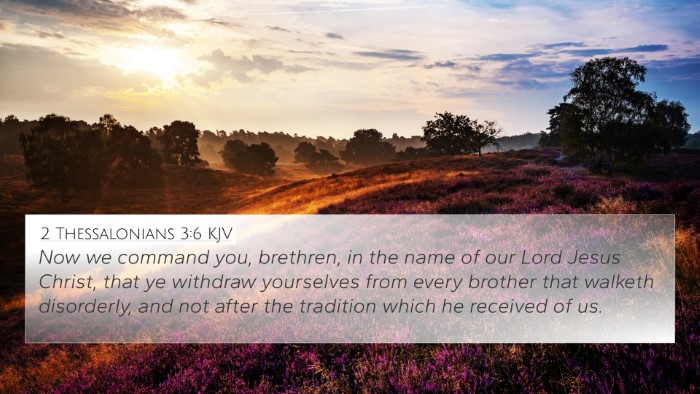
2 Thessalonians 3:6 (KJV) »
Now we command you, brethren, in the name of our Lord Jesus Christ, that ye withdraw yourselves from every brother that walketh disorderly, and not after the tradition which he received of us.
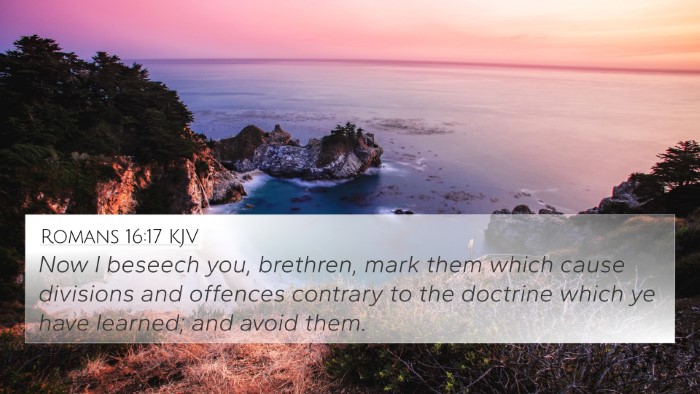
Romans 16:17 (KJV) »
Now I beseech you, brethren, mark them which cause divisions and offences contrary to the doctrine which ye have learned; and avoid them.

2 Thessalonians 3:14 (KJV) »
And if any man obey not our word by this epistle, note that man, and have no company with him, that he may be ashamed.

Matthew 18:17 (KJV) »
And if he shall neglect to hear them, tell it unto the church: but if he neglect to hear the church, let him be unto thee as an heathen man and a publican.

2 John 1:10 (KJV) »
If there come any unto you, and bring not this doctrine, receive him not into your house, neither bid him God speed:

1 Corinthians 5:13 (KJV) »
But them that are without God judgeth. Therefore put away from among yourselves that wicked person.
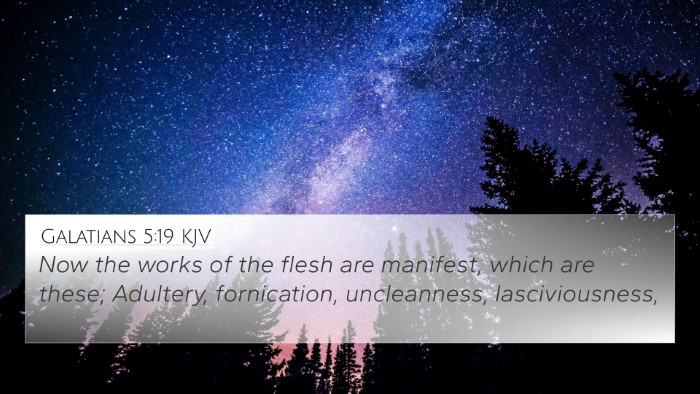
Galatians 5:19 (KJV) »
Now the works of the flesh are manifest, which are these; Adultery, fornication, uncleanness, lasciviousness,
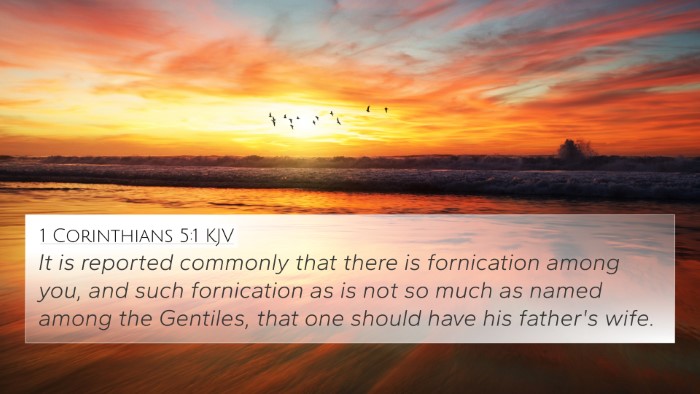
1 Corinthians 5:1 (KJV) »
It is reported commonly that there is fornication among you, and such fornication as is not so much as named among the Gentiles, that one should have his father's wife.

Revelation 22:15 (KJV) »
For without are dogs, and sorcerers, and whoremongers, and murderers, and idolaters, and whosoever loveth and maketh a lie.
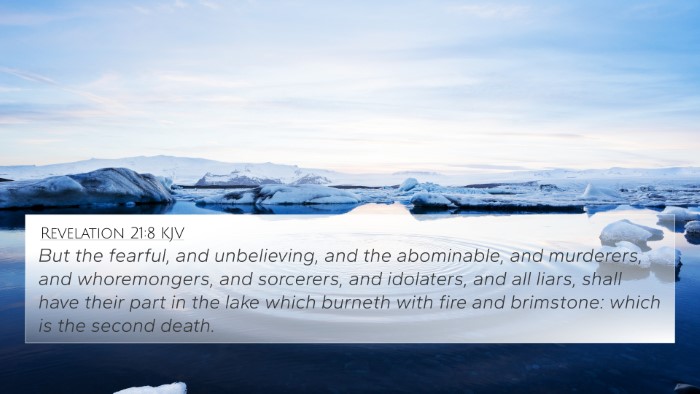
Revelation 21:8 (KJV) »
But the fearful, and unbelieving, and the abominable, and murderers, and whoremongers, and sorcerers, and idolaters, and all liars, shall have their part in the lake which burneth with fire and brimstone: which is the second death.
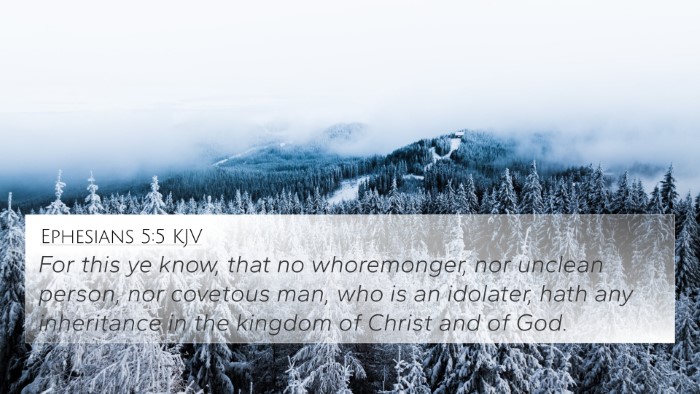
Ephesians 5:5 (KJV) »
For this ye know, that no whoremonger, nor unclean person, nor covetous man, who is an idolater, hath any inheritance in the kingdom of Christ and of God.

Luke 21:34 (KJV) »
And take heed to yourselves, lest at any time your hearts be overcharged with surfeiting, and drunkenness, and cares of this life, and so that day come upon you unawares.
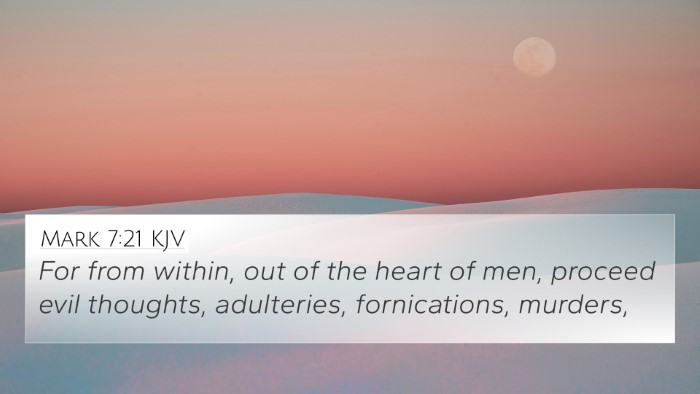
Mark 7:21 (KJV) »
For from within, out of the heart of men, proceed evil thoughts, adulteries, fornications, murders,
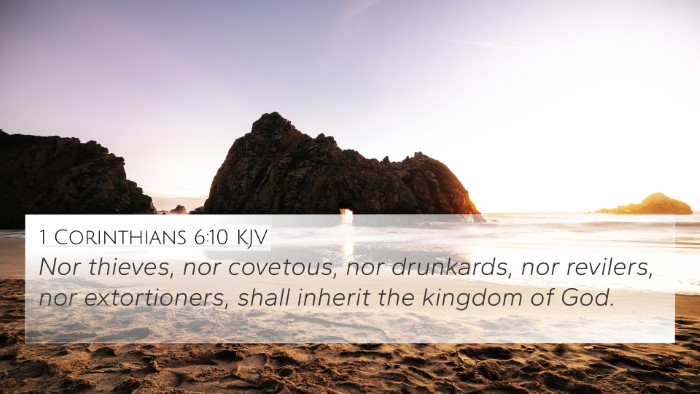
1 Corinthians 6:10 (KJV) »
Nor thieves, nor covetous, nor drunkards, nor revilers, nor extortioners, shall inherit the kingdom of God.

1 Thessalonians 5:7 (KJV) »
For they that sleep sleep in the night; and they that be drunken are drunken in the night.
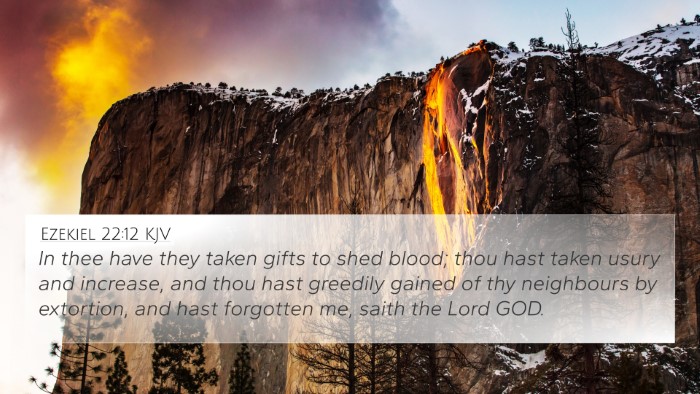
Ezekiel 22:12 (KJV) »
In thee have they taken gifts to shed blood; thou hast taken usury and increase, and thou hast greedily gained of thy neighbours by extortion, and hast forgotten me, saith the Lord GOD.

1 Timothy 3:3 (KJV) »
Not given to wine, no striker, not greedy of filthy lucre; but patient, not a brawler, not covetous;

Psalms 50:16 (KJV) »
But unto the wicked God saith, What hast thou to do to declare my statutes, or that thou shouldest take my covenant in thy mouth?

Romans 13:13 (KJV) »
Let us walk honestly, as in the day; not in rioting and drunkenness, not in chambering and wantonness, not in strife and envying.

Revelation 2:20 (KJV) »
Notwithstanding I have a few things against thee, because thou sufferest that woman Jezebel, which calleth herself a prophetess, to teach and to seduce my servants to commit fornication, and to eat things sacrificed unto idols.

Matthew 23:25 (KJV) »
Woe unto you, scribes and Pharisees, hypocrites! for ye make clean the outside of the cup and of the platter, but within they are full of extortion and excess.
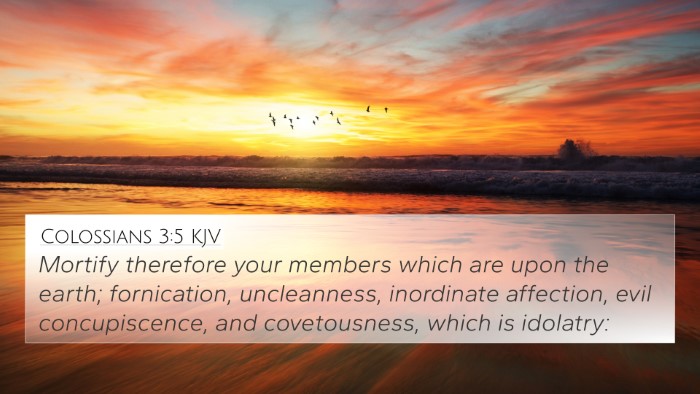
Colossians 3:5 (KJV) »
Mortify therefore your members which are upon the earth; fornication, uncleanness, inordinate affection, evil concupiscence, and covetousness, which is idolatry:

1 Thessalonians 4:3 (KJV) »
For this is the will of God, even your sanctification, that ye should abstain from fornication:

Psalms 101:5 (KJV) »
Whoso privily slandereth his neighbour, him will I cut off: him that hath an high look and a proud heart will not I suffer.
1 Corinthians 5:11 Verse Analysis and Similar Verses
Meaning and Interpretation of 1 Corinthians 5:11
The verse 1 Corinthians 5:11 states, "But now I have written to you not to keep company with anyone named a brother, who is sexually immoral, or covetous, or an idolater, or a reviler, or a drunkard, or an extortioner; not even to eat with such a person." This scripture presents significant insights regarding church discipline and the moral conduct expected of believers, emphasizing the need for maintaining purity within the community of faith.
Summary of Insights
In interpreting this verse, various public domain commentaries shed light on the Apostle Paul's admonitions to the Corinthian church. The focus is on the need to distance themselves from individuals who claim to be Christians yet engage in blatantly immoral behaviors. This practice of exclusion is aimed at preserving the integrity of the church, fostering an environment conducive to spiritual growth and holiness.
Commentary Insights
- Matthew Henry: Emphasizes the importance of church discipline and its role in maintaining spiritual cleanliness. He suggests that Paul’s directive is not about shunning those who fall into sin but about addressing unrepentant behavior among those who persist in their sins while claiming to be believers.
- Albert Barnes: Points out that Paul is distinguishing between sinners in the world and those within the church. The critical note here is the serious nature of the sins listed (e.g., sexual immorality, idolatry) and the apparent unrepentance that leads to a necessary break in fellowship for the sake of the community’s purity.
- Adam Clarke: Discusses the socio-religious implications of “eating” together, which in that culture symbolized acceptance and fellowship. Clarke suggests that Paul’s instruction is radical because it challenges believers to reevaluate their associations and to act firmly in the face of sin.
Connections to Other Biblical Texts
This verse connects with several other biblical texts, establishing a thematic dialogue on issues of moral conduct and the consequences of sin within the Christian community. The primary themes that emerge include sin, discipline, and the balance of love and judgment in church interactions.
Cross References
- Matthew 18:15-17: Jesus teaches on the process of addressing sin among brethren, echoing the need for confrontation and, if necessary, exclusion.
- 1 Corinthians 5:5: Earlier in this chapter, Paul advises delivering an immoral man to Satan for the destruction of the flesh, indicating severe measures for unrepentance.
- 2 Thessalonians 3:6: Paul instructs believers to withdraw from those who walk disorderly, reinforcing the necessity of maintaining the community's integrity.
- Galatians 6:1: Encourages restoration for those who are caught in sin, suggesting a spirit of grace must accompany correction.
- Titus 3:10: Advises a divisive person to be warned twice before being rejected, emphasizing cautious engagement in church discipline.
- Romans 16:17: Paul warns of those who cause divisions and offenses, urging believers to avoid them for the sake of unity.
- 1 John 1:6-7: Discusses the contradiction of professing fellowship with God while walking in darkness, affirming the need for alignment of belief and conduct.
Thematic Connections and Interpretations
The overall theme in 1 Corinthians 5:11 connects with broader scriptural principles of holiness, discipline, and the community of faith. Such themes recapitulate the duty of believers to uphold moral standards while navigating the complexities of fellowship.
Application for Believers
For contemporary Christians, this passage serves as a crucial reminder of the importance of maintaining personal and communal integrity. Engaging in serious reflection about relationships within the church is vital, ensuring that associations align with the faith's ethical demands. Moreover, the balance of love and accountability continues to challenge the church today, highlighting the need for grace alongside discipline.
Final Thoughts
In conclusion, 1 Corinthians 5:11 invites believers into a deeper understanding of their responsibilities toward one another in Christ. By drawing on comprehensive biblical cross-references and understanding the commentary insights, believers can better grasp the significance of this text within the broader canon of scripture.
Through cross-referencing biblical texts, believers can also uncover intricate connections, shedding light on how various scriptures dialogue about similar themes of sin, accountability, and community integrity. In this spirit, this verse acts as a vital piece in the complex tapestry of biblical ethics and the call to holiness in the life of the church.


